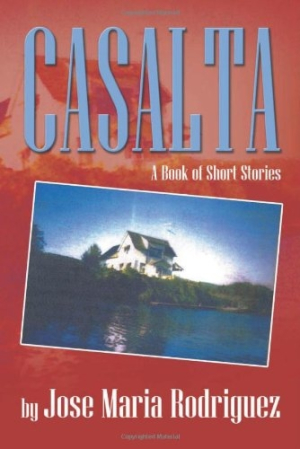Casalta
A Book of Short Stories
With characters who are “as grumpy as a baby cutting teeth” and who openly admit, “I hate that parakeet,” Jose Maria Rodriguez’s slim collection of six short stories makes for a quick, charming read for those who enjoy vignettes of everyday life.
Casalta, named for the author’s summer home on the Elochoman River in Washington State (and which shows up as the venue for one of the stories), is a light volume with very little meat on its spare, yet still savory, bones. The longest of the six stories is less than a dozen pages long, and three of the others are barely half that in length. This leaves very little space for the author to introduce his characters
Despite the brevity of his prose, the World War II veteran manages to convey at least a sense of who his characters are and what they are feeling. There is Herb, for example, who in “Plot through the Picture Window” is so obsessed with a painter who, by parking in front of his garbage cans, blocked the trash pickup that “when he finally fell asleep, he dreamed that he was floating down a stream of trash and that a host of sneering painters were lined along the banks of the stream, flipping their wet brushes at him.” The character Daddy in “Fecal Fowl” is another whose tale of domestic frustration will ring true to anyone who does not get along with a housemate’s pet.
As for the other four stories in the collection, “Fork on the Pearly Road” is a bit of an apocryphal tale, or a shaggy-dog story, where it takes eleven pages to deliver the punch line. “Journey with a Donkey” is something out of an old 1950s-era Dondi, the comic about an Italian war orphan. The tale is sweet and nostalgic, but it lacks energy and a real ending. “Saga of a Douche Bag” is quite literally a story about such a feminine hygiene device, but it, too, is a bit of a shaggy-dog story, although one where readers will see the punch line coming miles ahead. The final story, “Casalta,” is a nice but not overly sweet piece on senior citizens in love; it also contains a description of the “tall house,” or “casa alta,” from which the title of the book is drawn.
The back cover is a compilation of lines from that last story: “The house was very old, with the floors so uneven that to walk from the dining room to the kitchen, one could go downhill and gain speed.” This will resonate with anyone who has bought a fixer-upper.
Rodriguez’s style is conversational, light, and quick, and none of his stories take more time to read than the average time spent waiting for a meal to arrive in a diner. This is not great fiction, but it is pleasant, and most of it will strike a chord of recognition with those of a similar age and background to the author.
Reviewed by
Mark McLaughlin
Disclosure: This article is not an endorsement, but a review. The publisher of this book provided free copies of the book and paid a small fee to have their book reviewed by a professional reviewer. Foreword Reviews and Clarion Reviews make no guarantee that the publisher will receive a positive review. Foreword Magazine, Inc. is disclosing this in accordance with the Federal Trade Commission’s 16 CFR, Part 255.

